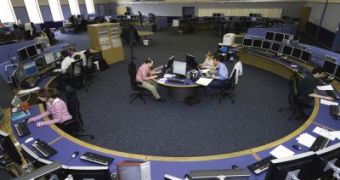"We are going to make mini Big Bangs. There has never been such a jump in particle physics. It will go into an area that we don't really understand," said Brian Cox of Manchester University at the annual meeting of the British Association for the Advancement of Science.
He is referring to a new experiment that will be conducted at the Large Hadron Collider, the 27km-long underground circular particle accelerator at the CERN experimental facility near Geneva on the Franco-Swiss border. Scientists will smash protons (hydrogen nuclei) into each other at such tremendous speeds that they expect to replicate the conditions during the Big Bang.
"It is an incredibly exciting machine. It will be turned on next year and run for at least a decade and probably 20 years and the first results - if the machine behaves itself - should start coming out within a year," Dr Cox said.
The experiment might also reveal the existence of other spatial dimensions which are postulated by various candidate theories to the "theory of everything". But the most important question is how matter appeared in the beginning of the universe.
"We don't know what 95 per cent of the universe is made of - which is a bit embarrassing for a subject that claims to be fundamental," Dr Cox said. "There is dark matter. It is all over the place but we have no idea what it is. There is also something called dark energy, and that is an even bigger question. It makes up about 70 per cent of the energy in the universe, but again we have absolutely no idea what it is."
Some physicists think that at first, there was nothing but, due to the uncertainty principle, the nothing "fluctuated" and as a consequence, the Big Bang happened. According to such views, there might be many universes.
If the theories are correct, the collider should create tiny black holes that evaporate and leave behind other particles. These particles might offer evidences about additional spatial dimensions above the familiar three ones we know.
"That would be an even bigger headline than the black holes. It could be that there is a whole new universe a millimeter away from our heads but at right-angles to the three dimensions that are here," Dr Cox said. "That would be a real paradigm shift - our relegation to a little sheet in a multi-dimensional universe. That kind of thing is really profound and will capture the imagination that perhaps the origin of mass won't, although it should. For the first time in many decades we have built a machine that exceeds our powers of prediction. New processes are bound to be discovered. We are truly journeying into unknown territory."
Some have worried that such an experiment that would create black holes could destroy the entire planet, but Dr Cox dismissed the worries. "The probability is at the level of 10 to the minus 40," he said. That is a 1 in 10,000,000,000,000,000,000,000,000,000,000,000,000,000 chance.

 14 DAY TRIAL //
14 DAY TRIAL //